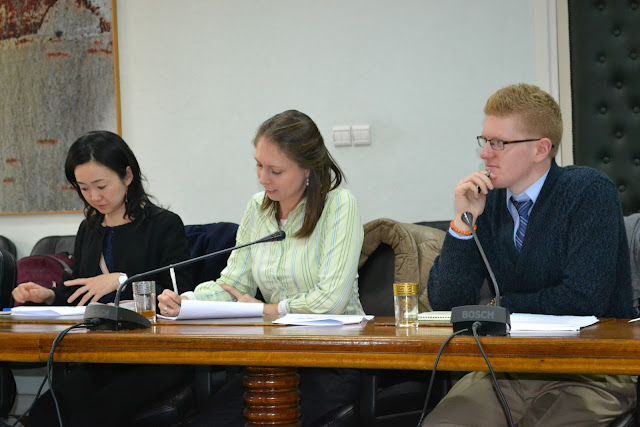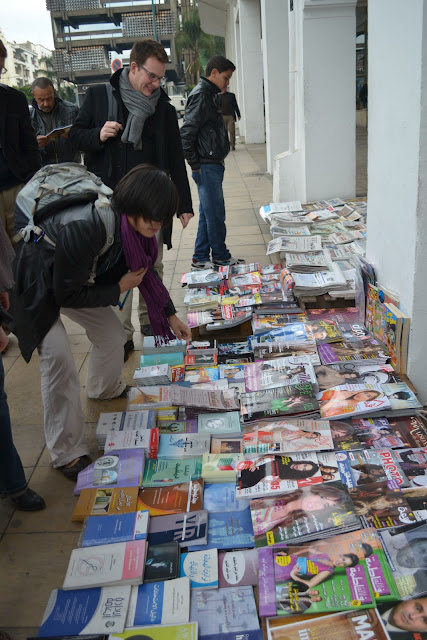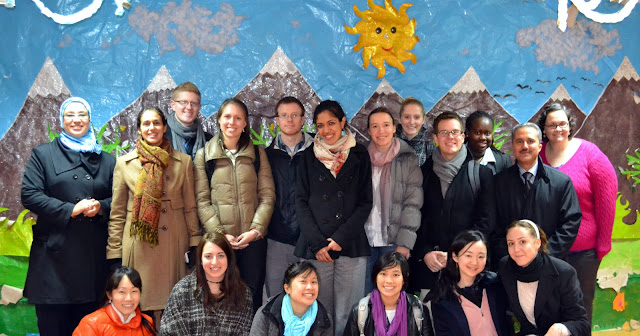Hi everyone! Apologies for the blogging delays...we had a few days of really touch-and-go (at best) internet access there that weren't at all conducive to photo uploading and blog posting. However, we arrived back in the states last night and the blog posts should be coming fast and furious for the next few days, in shaa'Allah.
We started our first early morning with a fast breakfast before heading out to grab five taxis (not the easiest task) to take us to our first meeting. After meeting up with Rita, we headed into an absolutely beautiful new building overlooking Rabat, which they were still in the process of putting together, painting, and furnishing. We were greeted by a large contingent from Rabat's AREF, or Academic Regional Office of Education and Training, an organization responsible for helping to decentralize the education system of Morocco and place more power in the hands of local school districts. The director is a women, first one we've met in a position that high, and she was very gracious in greeting us and launching into her presentation. It was also the first presentation in a room with heat, which was much appreciated on this very cold morning.
 |
| There was still shrink wrap on the sign! |
The reform (decentralizing control) is not easy, and is taking time to implement. There is a national strategy, but each AREF has the ability to mould it to meet the needs of their particular area. The AREFs, created in 2000 and operational in 2003, are tasked with working towards national educational decentralization and deconcentration of power, transferring control from the MoE to local ownership. The AREFs are financially independent, and each has a director that is in charge of planning, budgeting, and recruiting teams, as well as aligning local goals with the overall strategy of the MoE.
Mark asked if, in light of recent political changes including a new constitution and Minister of Education, they expected the government to become more or less willing to relinqush control and truly follow through with the decentralization plan. The director said that decentralization has taken place more in the MoE than other ministries. Current MoE officials will say that they have decentralized 85% of the budget, however from the AREF's point of view, the power hasn't really shifted. Even though the money has been channeled through them, it comes with strings and they are told how to spend it. Different cities have different priorities, and should be allowed to determine how best to spend their money. One example that was given was that of school building. After the Emergency Plan was put into place, the process of building schools was greatly slowed down because other priorities were defined by the MoE that hindered progress. When things are done at a national level instead of a local one, it often takes a much longer time and cannot be done as efficiently. The director described the decentralization process like cutting apart the pieces of a person (any other horror fans out there?) rather than creating a new person in each area that is independent and fully functioning. While they hope that the recent changes will reflect positively, no one is ever quite sure what the future holds.
 |
| Early morning meeting with the AREF. |
The challenge is not simply getting all students into school, but creating "schools of success," or schools of high quality. Morocco has made great progress in enrollment, however it created an issue of reduced quality that now need to be addressed. In Rabat there is almost 100% enrollment for primary school and very high in secondary school. It is important for Rabat to not only prepare students for academic success, but also instill within them with the 21st Century skills necessary to be successful in life and business. It is the goal of the AREF to support students in their development of a love of learning and a desire to continue their education both in and out of traditional educational institutions.
In 2008 there was a report from the Council for Higher Education that revealed both the progress towards goals and continued weaknesses evident in the Moroccan education system. It was this report that spurred the Emergency Plan. One of the identified weaknesses is drop out, of both students and teachers. The director feels that some teachers do not take their job seriously, even though it is a noble profession. There is also a problem of orientation for students, meaning they don't always know their options for the future, or how to attain them. Limited pedagogy is also a problem, as teachers need more strategies to share information with students. Finally, the government remains hesitant. Although there was a great deal of public pressure for decentralization and everyone expected it would be implemented, the government seems unwilling to relinquish power fully, which stifles the autonomy and flexibility of AREFs across the country. 500,000 students, 23,000 teachers and administrators.
 |
| The Director (right) explaining their programs. |
Completion rates for high school dropped a few years ago because the policy changed, and now it is harder to graduate (if you get a grade lower than 10/20) you cannot graduate, because they don't simply want to graduate students who are unqualified. This is part of the plan to strive for excellence within schools. Below is some recent data that sheds interesting light on the issues facing Moroccan education:
Drop out rates:
National
Rabat
Primary 3.3% 0.023%
Middle school 12.9% 2.08%
High school 13% 2.03%
Repetition Rates:
National Rabat
Primary 12% 5.8%
Middle school 16.1% 20%
High school 18.8% 16%
Completion Rates:
National Rabat
Primary 87.3% 91.01%
Middle school 53.8% 48.67%
High school 42.5% 55.53%
The Emergency Program brought much change, including the creation of schools with a common identity (how buildings look or common colors). The AREF of Rabat has used government provided funding to greatly improve facilities in many schools that sorely needed it. AREF's first step was to evaluate buildings and facilities, so they evlauated the condition of school facilities. They also made partnerships with organizations which provided them with money and materials to update existing infrastructures to make them safer and more attractive. In order to encourage schools to maintain themselves, a competition was created that awards prizes to schools that are clean, great, etc. It has proven very effective.
They focus on the artistic division, where they have competitions to inspire creativity in painting, drawing, music and theater. Students are encouraged to use their identity and experiences to create art. Science and technology is also extremely important to the AREF of Rabat. They provide technology and resources to all schools, including those in rural areas, to encourage students to learn about science. Citizenship is cultivated in each school, with students creating their own charters for schools that outline rules and expectations for their peers. Schools and students themselves are very invested in these programs, and are quite enthusiastic. These programs allow students to learn in different ways and find things that make them excited about education. This AREF is focused on "goose philosophy" where everyone works together to support eachother and, in doing so, is more efficient.
 |
| Student art illustrating the goose philosophy. |
Sophia and Rachel asked about how (if) the different AREFs worked together with each other as well as outside organizations. The different AREFs work within the same frameworks, with the same goals and projects. However each one is independent and picks a focus area. The director feels that Rabat gets kind of a raw deal, because everyone assumes that the capital city has everything they need and does not require extra support. This is not true, of course, which makes this difficult. At this point there is not much collaboration between the AREFs, however hopefully things will change in the future. Sometimes programs start in one AREF, and become national, like a poetry competition and movie competition that both began in Rabat.
The region of Rabat has the highest concentration of students with special needs, and has many organizations that work with them, including NGOs and international aid organizations. I asked about programs for students with special needs at the nonformal education division last week, and they told me to speak to the director of the AREF. I was given a great segue into the subject so I jumped on it. They have 70 classes for students with special needs in Rabat. Only 30% of all children with special needs are enrolled within this district. The classes at different schools are managed by different associations, and training of teachers is often provided by international organizations. Special schools are formed for students with Down Syndrome and cerebral palsy. The local AREF does adaptitive tests, and this year they even had a few students who were able to complete their baccalaureates in even very difficult subjects. Three students graduated this year, with CP, Down Syndrome, and autism. They were granted an audience with the king who ensured that they will be able to continue their education beyond high school. There is also a project underway to build a center for students with special needs. The director of a the project had personal experiences with a professor in a wheelchair that changed his perception of people with disabilities, and made him a passionate advocate for the rights of students with special needs. It should be ready at the end of 2012, so I have one year to learn French and Moroccan Arabic if I want a job there, haha.
 |
| Getting a tour of other facilities. |
Although I have found all of our meetings truly fascinating, I must say that this department was a favorite. Perhaps because it was headed by a woman, it felt as though they were the most collaborative, supportive group out of anyone we met with. She was also the only director to take the time to specifically thank her team, which I really appreciated. They really seem to live the "goose philosophy" and I think it would be a pleasure to work in an environment like that in the future.
 |
| Also, they gave us delicious cookies. |
Our next meeting was across down with the Office for Quality, an incredibly important part of the trip if we are to understand the way Moroccans measure the quality of their education system. Since the aim of this trip is to investigate quality, we were all extremely excited for this session and were very upset when it had to be cancelled last week when a meeting ran over time. Luckily, we were able to reschedule. Fun fact: This is the first presentation we have had in Arabic, all the rest have been in French. I found it a little harder to focus since I couldn't get a single word (I understand at least a little of the French), but Rita continues to impress with her incredible translating skills. She was listening to Moroccan Arabic, translating it to English, and asking questions back in French. Incredible.
At the beginning of the meeting, Rita introduced us all, and I couldn't help but be impressed by the broad range of international experience represented in this group of 15 students. Together we have lived in Argentina, Australia, Bahrain, China, Guinea, India, Japan, Liberia, Mali, Morocco, Russia, South Korea, Taiwan, and the United States. That is pretty sweet! Gatherings like this give me hope for the future as our world becomes increasingly globalized; we can get together, do important work, and HAVE FUN!
 |
| Sameera, Veronika and Brian ready to talk quality. |
The director of the quality department began by pointing out the fact that Morocco was the first country to recognize the US as a sovereign nation, which has led to a long, supportive relationship between the two countries. Education teaches values, and can promote peace. In the National Charter, there were six main pillars on which schools were to focus, one of which was quality of education. This includes preparing students for their future. Quality education is provided by the schools, and this department was created to support the quality learning at high standards. Morocco has been participating in TIMSS and PIRLS since 1991, and unfortunately, the evidence suggests that Moroccan students do not perform very well on these internatioanl tests. In order to improve this, special attention must be paid to the quality of schooling and teachers must be supported.
 |
| Rachel diligently taking notes at the meeting. |
This department aims to increase the quality of learning and the quality of academic content. Three main factors afect quality: inputs, processes, and outcomes. The dpearmtne of quality looked at the Japanese model, and American and European frameworks as benchmarks for how to develop a local system to evaluate quality. The work's foundations are in the creation of a quality system, implementing the system within educational institutions, and maintaining sustainable strategies to keep work going. There are various levels of quality systems, which include schools, regional organizations, national level etc. The division grants accreditation to schools that follow and enact quality standards.
 |
| Learning about quality! |
The Moroccan Framework for Quality (MFQ) has nine criteria: commitment to vision and values, leadership and strategic planning, human resources management, resource allocation, standardization and innovation, development process efficiency, just satisfaction of stakeholders, results and performance, and improvement and future plans. There are a lot of implications of the framework. It hopes to raise awareness about how important quality education is for society, involve different stakeholders, and create a culture that supports educational quality.
Different methodologies are used to measure quality in different institutions. Quality audits are used to compare performance to international standards. The process starts with an initial meeting where the process is explained. A follow-up visit allows everyone to define the steps and measures used to evaluate. The third step is to create an evaluation and distribute it among the auditors. Finally, a report is composed detailing the results and this is shared with the organization. Projects are changed depending on the evironment, and different things are required of different schools. All of this is refered to as the National Strategy for the Quality of School Projects. It is part of the ongoing process to empower schools. Proximity is also important as schools are evaluated in a locally applicable way.
Challenges to quality implementation include principals with varying performance levels, limited scope of evaluation at participating schools, a lack of stakeholder commitment, and a limited capacity for coaching and supervising classroom instruction (especially in rural areas). Principalship requiers management skills, budgetting, monirtoring and evaluation, each of which requires its own training, leading to the creation of training teams for each topic. These courses work to prepare teachers to meet international standards. One problem with training is the difficulty ensuring that the skills are sustainable and able to be applied in all settings. Equity must be present in all levels (from individual schools through the ministry) in order to get the highest quality schools.
 |
| Quick group photo in the lobby before heading out. |
We snuck in a quick lunch and perusal of some local newspapers and magazines on our way to our final meeting.
 |
| Keeping up with the latest news! Well...sort of. |
Our last "real" meeting of the day was with the department of higher education. I was so tired (they put us in a warm room with low lights and I was a goner) and my notes are absolute crap, so Kana and Mike (our resident higher ed afficionados) are going to do a guest blog on the higher ed system here in Morocco.
 |
| This room begs to be napped in... |
Before heading to dinner, we took a spin by the preschool that had been lending us their bus for the week. We were met by the extremely gracious head of the school and his assistant who showed us around the absolutely beautiful school. It was colorful, and open, and really supported young learners. The school teaches students aged 3-5 and when they first come into the class they are taught in the language spoken at home (either French or Arabic). As the year progresses the languages are blended more to increase proficiency in both. The walls are covered in student art/work and it just seems like exactly the kind of place I would want to send my preschooler. We were very very impressed.
 |
| The wonderful director of the center. |
 |
| Fun kid artwork! |
 |
| Open, colorful, exciting classrooms. |
 |
| I think this mountain backdrop (completed by the preschoolers with teacher help) was totally awesome. The preschool visit was a great way to end the day |
After saying our goodbyes and profusely thanking them for the use of their bus, we headed off to dinner at the Carrefour food court (overpriced but tasty "Asian" food at Bangkok Cafe for me) where we ate incredibly delicious cake and sang Afi into her 25th year on earth. Then it was time to go home and crash in preparation for an early morning.

















No comments:
Post a Comment